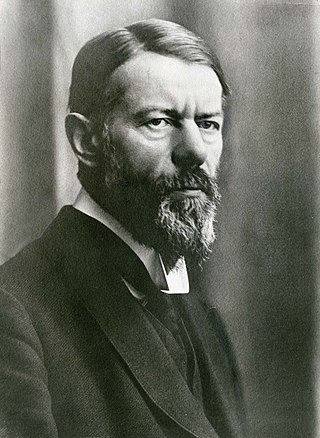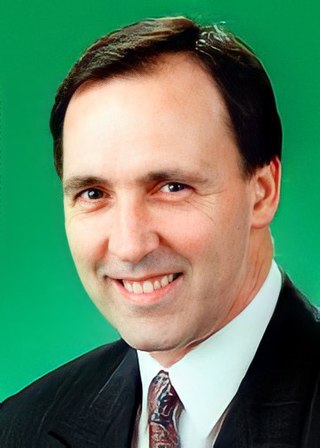Capitalism is an economic system based on the private ownership of the means of production and their operation for profit. Central characteristics of capitalism include capital accumulation, competitive markets, price systems, private property, property rights recognition, voluntary exchange, and wage labor. In a market economy, decision-making and investments are determined by owners of wealth, property, or ability to maneuver capital or production ability in capital and financial markets—whereas prices and the distribution of goods and services are mainly determined by competition in goods and services markets.

Maximilian Karl Emil Weber was a German sociologist, historian, jurist and political economist, who is regarded as among the most important theorists of the development of modern Western society. He was one of the central figures in the development of sociology and the social sciences, and his ideas profoundly influence social theory and research.

Paul John Keating is an Australian former politician who served as the 24th prime minister of Australia from 1991 to 1996, holding office as the leader of the Australian Labor Party (ALP). He previously served as the treasurer of Australia in the Hawke government from 1983 to 1991 and as the 7th deputy prime minister of Australia from 1990 to 1991.

Thatcherism is a form of British conservative ideology named after Conservative Party leader Margaret Thatcher that relates to not just her political platform and particular policies but also her personal character and style of management while in office. Proponents of Thatcherism are referred to as Thatcherites. The term has been used to describe the principles of the British government under Thatcher from the 1979 general election to her resignation in 1990, but it also receives use in describing administrative efforts continuing into the Conservative governments under John Major and David Cameron throughout the 1990s and 2010s. In international terms, Thatcherites have been described as a part of the general socio-economic movement known as neoliberalism, with different countries besides the United Kingdom sharing similar policies around expansionary capitalism.
The Third Way, also known as Third Way social democracy, Third Way neoliberalism or economic rationalism is a centrist political position that attempts to reconcile centre-right and centre-left politics by synthesising a combination of neoliberal economic policies of the former along with social democratic social policies of the latter.
New Right is a term for various right-wing political groups or policies in different countries during different periods. One prominent usage was to describe the emergence of certain Eastern European parties after the collapse of the Soviet Union. In the United States, the Second New Right campaigned against abortion, homosexuality, the Equal Rights Amendment (ERA), the Panama Canal Treaty, affirmative action, and most forms of taxation.

The Protestant Ethic and the Spirit of Capitalism is a book written by Max Weber, a German sociologist, economist, and politician. Begun as a series of essays, the original German text was composed in 1904 and 1905, and was translated into English for the first time by American sociologist Talcott Parsons in 1930. It is considered a founding text in economic sociology and a milestone contribution to sociological thought in general.
Market fundamentalism, also known as free-market fundamentalism, is a term applied to a strong belief in the ability of unregulated laissez-faire or free-market capitalist policies to solve most economic and social problems. It is often used as pejorative by critics of said beliefs.
The Protestant work ethic, also known as the Calvinist work ethic or the Puritan work ethic, is a work ethic concept in scholarly sociology, economics, and historiography. It emphasizes that diligence, discipline, and frugality are a result of a person's subscription to the values espoused by the Protestant faith, particularly Calvinism.

"There is no alternative" (TINA) is a political slogan arguing that capitalism is the only viable system. The slogan is strongly associated with the policies and persona of the Conservative British prime minister Margaret Thatcher.

This is a chronological list of works by Max Weber. Original titles with dates of publication and translated titles are given when possible, then a list of works translated into English, with earliest-found date of translation. The list of translations is most likely incomplete.
In sociology, the term rationalization was coined by Max Weber, a German sociologist, jurist, and economist. Rationalization is the replacement of traditions, values, and emotions as motivators for behaviour in society with concepts based on rationality and reason. The term rational is seen in the context of people, their expressions, and or their actions. This term can be applied to people who can perform speech or in general any action, in addition to the views of rationality within people it can be seen in the perspective of something such as a worldview or perspective (idea). An example of rationalization can be seen in the implementation of bureaucracies in government is a kind of rationalization, as is the construction of high-efficiency living spaces in architecture and urban planning. A potential reason as to why rationalization of a culture may take place in the modern era is the process of globalization. Countries are becoming increasingly interlinked, and with the rise of technology, it is easier for countries to influence each other through social networking, the media and politics. An example of rationalization in place would be the case of witch doctors in certain parts of Africa. Whilst many locals view them as an important part of their culture and traditions, development initiatives and aid workers have tried to rationalize the practice in order to educate the local people in modern medicine and practice.
The Anglo-Saxon model is a regulated market-based economic model that emerged in the 1970s based on the Chicago school of economics, spearheaded in the 1980s in the United States by the economics of then President Ronald Reagan, and reinforced in the United Kingdom by then Prime Minister Margaret Thatcher. However, its origins are said to date to the 18th century in the United Kingdom and the ideas of the classical economist Adam Smith.
Economic progressivism or fiscalprogressivism is a political and economic philosophy incorporating the socioeconomic principles of social democrats and political progressives. These views are often rooted in the concept of social justice and have the goal of improving the human condition through government regulation, social protections and the maintenance of public goods. It is not to be confused with the more general idea of progress in relation to economic growth.
In sociology, the iron cage is a concept introduced by Max Weber to describe the increased rationalization inherent in social life, particularly in Western capitalist societies. The "iron cage" thus traps individuals in systems based purely on teleological efficiency, rational calculation and control. Weber also described the bureaucratization of social order as "the polar night of icy darkness".
"The rich get richer and the poor get poorer" is an aphorism attributed to Percy Bysshe Shelley. In A Defence of Poetry Shelley remarked that the promoters of utility had exemplified the saying, "To him that hath, more shall be given; and from him that hath not, the little that he hath shall be taken away. The rich have become richer, and the poor have become poorer; and the vessel of the State is driven between the Scylla and Charybdis of anarchy and despotism." It describes a positive feedback loop.

The Hawke–Keating government is an all-encompassing term to describe the duration of the Hawke government and the Keating government, which together spanned from 11 March 1983 to 11 March 1996. Both governments were formed by the Australian Labor Party, and were led from 1983 to 1991 by Bob Hawke as Prime Minister, and from 1991 to 1996 by Paul Keating as Prime Minister, with Keating serving as Treasurer throughout the Hawke government. During the Hawke–Keating government, the Labor Party won five successive federal elections, its most electorally successful period to date; the 13-year uninterrupted period of government also remains the Labor Party's longest spell in power at the federal level.

The Hawke government was the federal executive government of Australia led by Prime Minister Bob Hawke of the Australian Labor Party (ALP) from 1983 to 1991. The government followed the Liberal-National Coalition Fraser government and was succeeded by another Labor administration, the Keating government, led by Paul Keating after an internal party leadership challenge in 1991. Keating was Treasurer through much of Hawke's term as prime minister and the period is sometimes termed the Hawke-Keating government.
Throughout modern history, a variety of perspectives on capitalism have evolved based on different schools of thought.
Privatisation in Australia is the process of transiting a public service or good to the private sector through a variety of mechanisms that was commenced by the Federal Government in the 1990s, receiving bipartisan support. More generally, privatisation is a set of economic policies that is part of a broader system of deregulation of government services, underpinned by the ideology of Liberalism, in order to achieve economic outcomes of growth, efficiency and productivity. Some examples of sectors that have been privatised include finance, telecommunications and infrastructure. Australia's public service has also transformed with the introduction of New Public Management (NPM) in the late twentieth century which altered public administration models to appear more "business-like" through performance evaluations that emphasise efficiency, productivity and service delivery.






